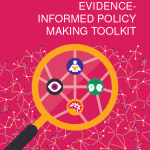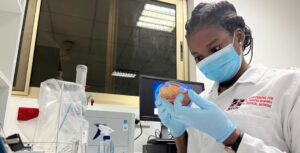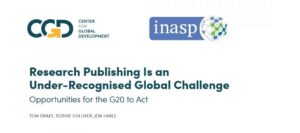
Series: ‘Q&A’ with Publishers for Development speakers
Dr Philip Antwi-Agyei is an interdisciplinary environmental scientist from Ghana who will be speaking at Publishers for Development in June. He will discuss his research on climate change, farming and food security and the importance of having access to research literature in relation to his work and the Sustainable Development Goals (SDGs).
What is your research focus?
My research involves developing ways to assess vulnerability and adaptations to climate change and variability for dry land African farming systems. My work is aimed at empowering local communities and broadening understanding of how climate variability affects food security and rural livelihoods. My research outputs have been published in leading international journals including Regional Environmental Change, Land Use Policy, Applied Geography, Climate and Development.
How does your work relate to the Sustainable Development Goals (SDGs)?
My research is closely linked to the Sustainable Development Goal 13, “Take urgent action to combat climate change and its impacts” as well as SDG 2, “End hunger, achieve food security and improved nutrition and promote sustainable agriculture”. I have worked with communities to understand how climate change could adversely impact food security and rural livelihoods in dry land farming systems.
What are the key challenges in the research and knowledge sector in your country?
Researchers in Ghana are confronted with a number of challenges. In my own experience, access to quality e-journal articles on climate change is problematic. Climate change as an emerging challenge has gained research traction in developed countries, yet, there is lack of research in developing countries, including Ghana, where the impacts of climate change will be acutely felt. Second, funding for research is also a major problem for researchers in Ghana. Budgetary allocation for research in many Africa countries remains quite low, because of competing demand among different sectors for limited government resources.
Can you see a way in which having access to published research can support international development
One cannot talk about development of a country without access to the basic necessities of life including shelter and food. Access to published research helps researchers to advance the frontiers of knowledge in sustainable food production in order to reduce malnutrition. Specifically, by having access to quality published research, I developed a methodological framework that have been used widely by both academic researchers and development practitioners to guide actions aimed at tackling the impacts of climate change on livelihoods.
Who has inspired you in your work and why?
I have been inspired in my research by my Ph.D supervisors – Prof Andrew Dougill and Prof Lindsay Stringer (University of Leeds, UK) and Prof Evan Fraser (University of Guelph, Canada) who taught me the rudiments of research. Their commitment, zeal and tenacity in seeing things done in the right way have been a source of great inspiration to me. Their belief in me has given me self-confidence and the “can do attitude” that have been quite useful in my career.
Dr Philip Antwi-Agyei is an interdisciplinary environmental scientist and Senior Lecturer at the Kwame Nkrumah University of Science and Technology, Kumasi, Ghana. As a Commonwealth Scholarship Scholar, he obtained his Ph.D from the University of Leeds, United Kingdom.

 Previous Post
Previous Post



Research policity in my country (SUDAN) is an immergent policy since increase the needs for knowledge to face needs for nutritional and social improvement,, sudanese researchers are very innocative and stimulant for their ccommunity , they inspired by theie soxietal needs which motivate them to seek for reasons tha lead to this deterioration .
Unfortunately the fovernmental fundings to these type of researches is limited in spite of reduce costs. Alot of researchers did their works using their own efforts by beggind aid from local or intermational supporters and most of thesee research are exclusively used for their benefits